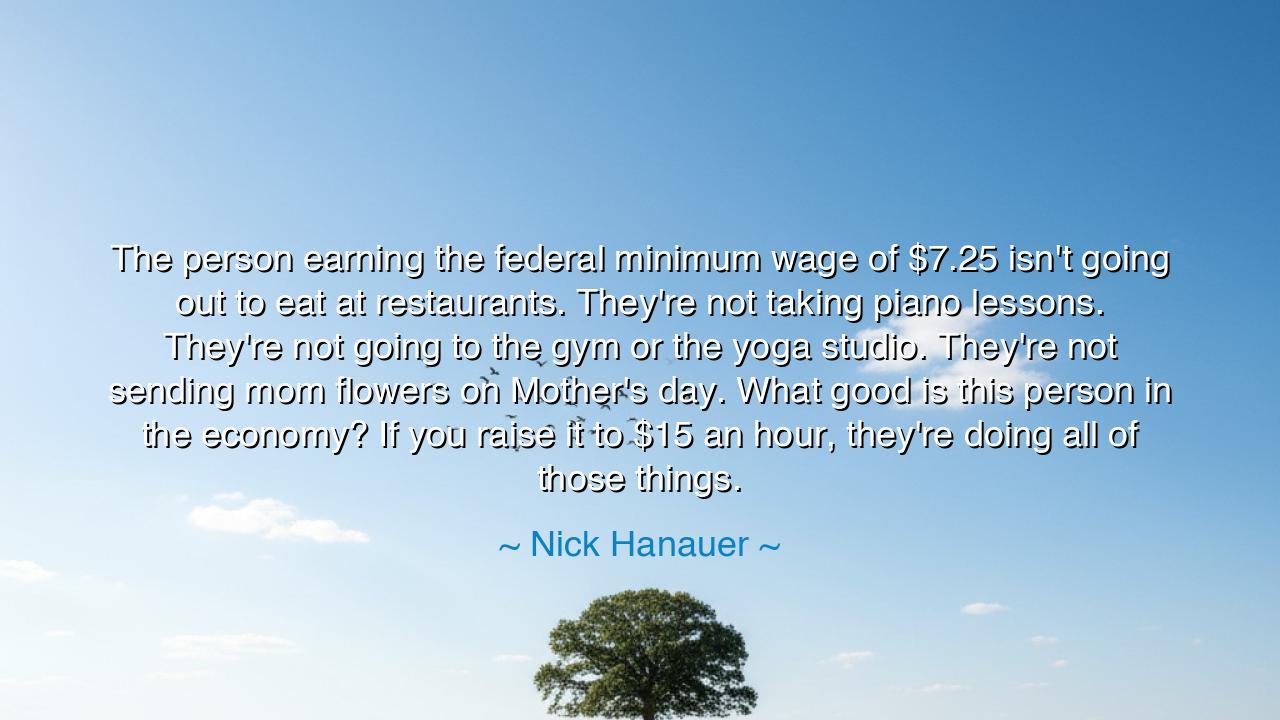
The person earning the federal minimum wage of $7.25 isn't going
The person earning the federal minimum wage of $7.25 isn't going out to eat at restaurants. They're not taking piano lessons. They're not going to the gym or the yoga studio. They're not sending mom flowers on Mother's day. What good is this person in the economy? If you raise it to $15 an hour, they're doing all of those things.






The words of Nick Hanauer, “The person earning the federal minimum wage of $7.25 isn’t going out to eat at restaurants. They’re not taking piano lessons. They’re not going to the gym or the yoga studio. They’re not sending mom flowers on Mother’s Day. What good is this person in the economy? If you raise it to $15 an hour, they’re doing all of those things,” sound not merely as an argument of economics, but as a declaration of justice — a call to restore balance to the human order. Beneath his pragmatic reasoning lies a truth the ancients would have recognized well: that prosperity cannot endure when the many live in deprivation and the few feast in abundance.
In ancient times, the philosophers and lawmakers of great civilizations understood that the strength of a nation lies not in its palaces, but in the dignity of its people. The wise emperor Ashoka of India, after seeing the suffering caused by his own conquests, declared that the measure of a ruler was the well-being of even the humblest farmer. In Rome, when the grain of the poor was withheld, rebellion and ruin soon followed. Hanauer’s words echo this timeless lesson: an economy — like a kingdom — cannot flourish when its foundation is built upon the hunger of its workers. For a society that starves its laborers starves itself.
Hanauer, a man of wealth himself, speaks as one awakened to the ancient truth that money must move to give life. When the poor are paid a fair wage, the cycle of vitality begins: the baker buys fruit from the farmer, the farmer repairs his tools, the craftsman feeds his children, and the whole society hums with renewal. But when wages stagnate, the stream of life dries up, and the nation grows sick. The ancients would have likened this to a river dammed by greed, where the waters that should nourish all become stagnant and foul. Thus, Hanauer’s plea is not only economic but moral: to give the poor enough to live is to give the nation strength enough to thrive.
The story of Henry Ford in the early 20th century reveals this wisdom reborn in modern form. When he raised his workers’ wages to $5 a day — a shocking sum at the time — the powerful mocked him, saying he would ruin his company. Yet Ford replied that if his workers could not afford to buy the cars they built, what was the use of building them? Soon, his business flourished, and so did his employees. He proved what Hanauer now reminds us of: that when people are given the means to live decently, they do not hoard; they participate joyfully in the economy, and in doing so, they lift all ships upon the rising tide.
Hanauer’s words also pierce through the illusion of individualism that clouds modern thought. He reminds us that we are bound together by invisible threads — that the prosperity of one depends upon the well-being of another. The woman who cleans the restaurant, the man who delivers the food, the teacher, the mechanic, the artist — all sustain the great organism of society. The ancients would have called this the “Harmony of the Polis,” where every person, high or low, contributes to the balance of the whole. To deny the poor a living wage is not merely unkind; it is to tear at the very fabric of civilization.
In his challenge, Hanauer also speaks to the moral blindness of the wealthy, warning that greed, left unchecked, is self-destructive. A people who cannot afford to live cannot afford to hope — and a nation without hope rots from within. The rich, he says, must remember that their prosperity is not built in isolation, but on the labor of others. When they lift their workers, they lift themselves; when they oppress them, they dig their own graves. The ancients told of kings who ignored the cries of the poor and were overthrown by fate — reminders that justice is not charity but survival.
So, what lesson must we carry forward from these words? It is this: value human dignity above profit, and the world will prosper. Pay fairly. Share generously. Recognize that the measure of success is not the wealth of the few but the wellness of the many. If you are an employer, lift your workers. If you are a citizen, demand fairness. And if you are poor, hold your head high, for your labor sustains the earth itself.
For as Nick Hanauer reminds us, an economy is not a machine — it is a living body, and its health depends upon the heartbeat of its people. When the least among us can live with dignity, joy returns to the world. And only then can the music of civilization — the laughter, the arts, the families, the shared tables — truly begin to play again.






AAdministratorAdministrator
Welcome, honored guests. Please leave a comment, we will respond soon